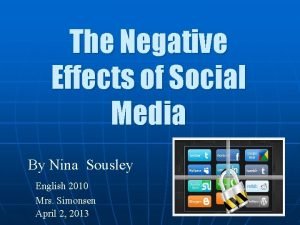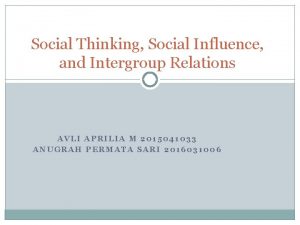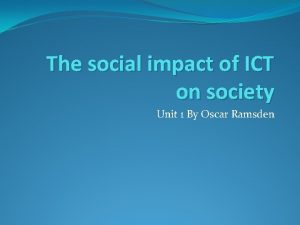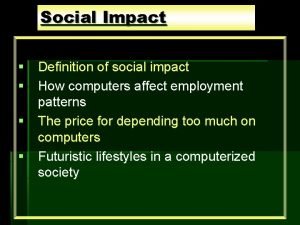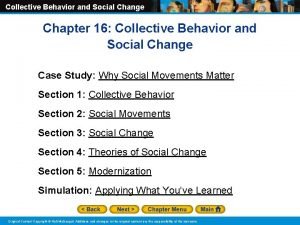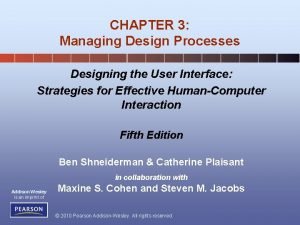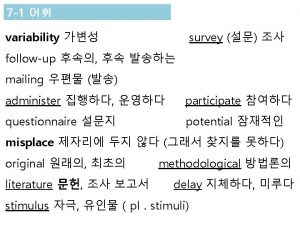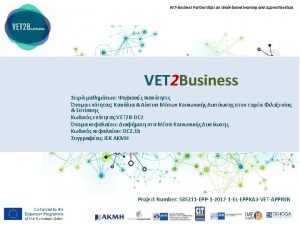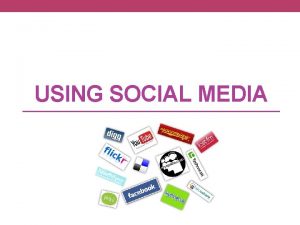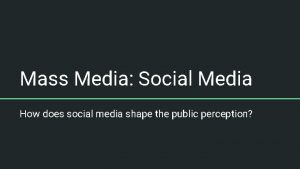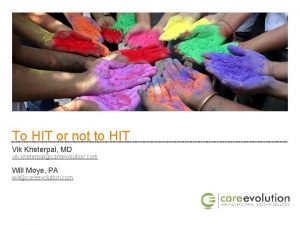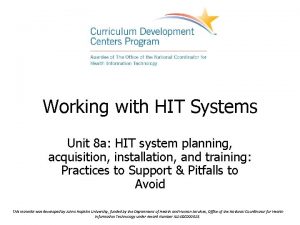Dont Hit Send The Impact of Social Media
























































- Slides: 56

Don’t Hit Send: The Impact of Social Media on Brain Development ADDICTED TO TECHNOLOGY • Michael Nerney and Associates • PO Box 93, Long Lake, NY, 12847 • michaelfnerney@gmail. com • 518 -624 -5351

“You’re gonna have to face it” • The Growing Problem Of Smartphone Addiction • By Brenda Priddy, Guest Contributor to Tech. Addiction • Smartphone Addiction Psychololgy Today • Nomophobia- fear of being without your smartphone- affects 40% of the population • Smartphone addiction could be changing your brain • by Sandee La. Motte, CNN

Smart Phone Addiction • i. Phone Separation Anxiety Makes You Dumber, Study Finds University of Missouri • By Jack Linshi January 11, 2015 • Nomophobia • FOMO • Selfitis

Smart Phone Addiction • Do You Have 'Phantom Vibration Syndrome'? • By Tim Locke • Tech Neck • Selfie Stomach • Gamer’s Thumb

DENIAL-Not just a river in Egypt • Hypernatural Monitoring: A Social Rehearsal Account of Smartphone Addiction No evidence from “good” studies Limited consequences

Studies vs Surveys • Self Report • Anonymous • Studies: • Causation • Correlation • Association Strong Weak

Brain Imaging Systems • CAT • PET • MRI/f. MRI • DSI

Brain Studies

Brain Studies • Infant/Stranger Studies • Mom’s face and eyes • Not available online

Social Media and the Adolescent Brain • New Resource:

ONLINE ACCESS • What age? • Average is 8 • 39% falsify age for Social Media • 20% have SM account unknown to parents • Which devices?

ONLINE ACCESS • Which conditions? • When can you use? • 92% daily, 24% almost constantly, 56% several times • Which Apps can you have? Positive, Neutral, Negative • What safeguards? • 70% of parents worry, 50% have installed parental control

Apps are Us • Social interaction: Facebook, Instagram, Snapchat, Twitter, Google+, Vine, Pinterest, Tumbler, Whats. App, Reddit • Video chat: Skype, Facetime, Oovoo, Omegle • Education/Learning: Exam Time, Mind Maps, Flashcards, Remind • Gossip Apps: Whisper, Rumr, Ask. fm Burn. Note

Advise Parents/Guardians Re: Contract • I will stick to the usage allowed with our cell phone plan. • My cell phone must be turned off at ****_ each night. • I agree that if I am unable to keep up with my promises, the use of my cell phone will be taken away from me. My phone can be taken away. • I will not use my cell phone to take pictures or video of nudity, violence, or other unlawful activities. • I will not use my cell phone to call anyone for malicious purposes.

Advice to Parents/Guardians • Access • Remote shut down • You ARE the BOSS of them Set Controls

High Risk Apps • Omegle

Other Similar Apps • Chat. Roulete, Chat. Random, Chat. Roomly, Chat. Rad, Quiero. Chat • Video. Chat. US, Bazoocam, i. Meetzu, Dirty. Roulete • And many, many more

Impact on Brain Development • Exposure to Pornography • Exposure to Sexual Deviance • Compulsive/Addicted Viewing • Compulsive/Addicted Gaming • Manipulation/Mistrust

UCLA STUDY • Brain Activity from “Likes” study • Snapchat photos posted and “liked” • Response to other “liked” photos • Activity in NA reward sites

Degrading or Cyberbullying Potential • Kik Messenger • Ask. FM • Rumr • Whisper

Classroom Contract • I will not use my cell phone during class

THE BIG THREE • Negative impact on learning • Preventing peer to peer damage(Cyberbulling) • Safeguarding children from internet dangers

Impact on Learning • Time on game tasks • Family conflict • Sleep deficits • Negative emotions

To sleep, perchance to learn • 13 -17 year old students • 50% report 30 plus hours per week video gaming • 73% of teens have smartphones, and ¾ post every day Impact on sleep Prolonged sleep onset, reduced slow wave sleep, more stage 2

i. Pad vs Printed page Sleep study • Brigham and Women’s Hospital, National Academy of Sciences • i. Pads, Tablets, Laptops, i. Phone • i. Pads-Longer to fall asleep Felt less sleepy at night More tired during daytime Lower Melatonin release Shorter REM cycles

Sleep Disruptors

Park the Phone

First things first • Sleep! • Normal sleep needs • Cognitive errors • ER errors

Sleep deficits • Fewer than 20% • Physical risks • Emotional risks • Behavioral risks • Academic risks

Sleep deficits • Impact on school performance • Double digit drop in memory, and problem solving • Attentional deficits, problematic behaviors, hostility • Tardiness, missing homework, less class participation

Sleep Deficits and Mental Health • Journal of Youth and Adolescence February 2015 • Teens need • Teens get 9 hours average sleep 6. 5 hours average sleep • Each hour of lost sleep associated with increased risk: • 23% substance abuse, 38% feeling sad and hopeless • 42% considering suicide, 58% attempting suicide

Sleep Deficits

Strategies • For Students: Health classes, Biology classes, Freshman seminars, Sports programs, Exam prep • For Administration, Social worker, School Psychologist, Counselor • Set of questions regarding sleep for any student struggling with executive function, self control, judgement, academics, and behavior • For Parents: Parent University, Parent Newsletter, Pre Exam Advice, One to One all focused on Teen sleep needs

Nothing like a good book • Books/paper have the following advantages over digital devices • Better recall of plot, characters, overall content • Higher levels of engagement, greater empathic response • Tactility, scrolling, multiple page access • Two dimensional • Not universal

Tablet/laptop vs Handwritten Notes • “The pen is mightier than the keyboard” Psychological Science • Speed of notetaking • 33 to 22 per minute • Learning Functions • Recall, concepts, vocabulary

Video Games: Attitudes, Beliefs, and Actions Some studies: Greater levels of hostility More arguments More fights Lower empathy Sleep deficits Some studies: Higher problem solving Multiple strategies Greater resiliency Improved detail awareness Better eye hand coordination Sleep deficits

Antisocial vs Prosocial • Extended video game playing-violent content • Variables, personality characteristics, game dynamics

Internet addiction 8 -10% of teen users • Tolerance • Withdrawal • Loss of Control • Continued Abuse in Spite of Consequences

Internet Addiction • Brain Imaging • 154 fourteen year old boys • Excessive Gaming • Changes to Ventral Striatum

Adolescent Brain Development • Risk Taking • New Sites of Activity • Influence of Peers • Male/Female

Preventing damage from peers • CYBERBULLYING ON THE RISE • 95% have seen it • 55% see it regularly • 66% have seen peers jump in • 21% admit to it

Preventing damage from peers • Emotional Intensity • 2 to 4 Times • More Frequent Change • Male/Female • Legitimate/Normal

. Preventing damage from peers • Emotional Intensity • Mirror, Mirror • AA sites • Male/Female Brain Differences

Girls vs Boys Facebook depression Social Media Anxiety

Girls vs Boys • Depression • Serotonin Synthesis • i. Gen

i. Gen

Preventing Damage Done By Peers • Intentional Meanness • 30% plus • Social Media Revenge • Evening the Score

Identifying negative behaviors Intentional Meanness Public put down, joke, disparagement Relative equality, friendship Good for brief uptick in social status Reflective remorse • As many as 30% • Males-26% Females-24% H-T

Outcomes of Cyberbullying • Negative Emotions and Stress Chemistry Change in Area 25 • • Sleep Disorders Low self esteem Depression Suicide

Outcomes of Cyberbullying • Depression • 2 -3 x the risk for depression • Higher levels of worthlessness, powerless • Increase in social anxiety, hypervigilance • Decrease in academic performance

Suicide as Cause of Death

School or Agency Response • Check Policy • Contact App Developer • Take Steps • Everyday reminders

SECURITY • Talk to your students/children/clients about avoiding sex talk online. • Research shows that teens who don't talk about sex with strangers online are less likely to come in contact with predators. In fact, researchers have found that predators usually don't pose as children or teens, and most teens who are contacted by adults they don't know find it creepy. • Teens should not hesitate to report, ignore or block them. • Tell your students/clients Not to Forward Sexual Photos

Adults Can Influence Online Behaviors • Once you post, you lose control • Golden Rule • The ones you love • Don’t hit send-----until you’re sure

Priorities

What can we do? • Support research and promote education • Influence policy makers • Teach parents and empower them • Practice what you preach • Come, play, put your electronic device away
 Don't hit send
Don't hit send Dont ask dont tell political cartoon
Dont ask dont tell political cartoon Don't laugh at me allen shamblin
Don't laugh at me allen shamblin The negative impact of social media on students
The negative impact of social media on students Social media impact on sleep
Social media impact on sleep People in media and people as media differences
People in media and people as media differences Social thinking and social influence
Social thinking and social influence Social thinking social influence social relations
Social thinking social influence social relations Positive impacts of ict
Positive impacts of ict Social impact of ict in education
Social impact of ict in education Georgia social impact collaborative
Georgia social impact collaborative Social impact of computers
Social impact of computers When did pax romana begin
When did pax romana begin Effects of environmental disasters
Effects of environmental disasters Pay for success bonds
Pay for success bonds Social impact model
Social impact model Social enterprise pitch deck
Social enterprise pitch deck Treatment options
Treatment options Negative social change
Negative social change Social impact statement for early design review
Social impact statement for early design review Social impact stellenbosch university
Social impact stellenbosch university Augustus caesar pax romana
Augustus caesar pax romana Social impact statement for early design review
Social impact statement for early design review Hát kết hợp bộ gõ cơ thể
Hát kết hợp bộ gõ cơ thể Ng-html
Ng-html Bổ thể
Bổ thể Tỉ lệ cơ thể trẻ em
Tỉ lệ cơ thể trẻ em Gấu đi như thế nào
Gấu đi như thế nào Glasgow thang điểm
Glasgow thang điểm Chúa yêu trần thế
Chúa yêu trần thế Môn thể thao bắt đầu bằng từ đua
Môn thể thao bắt đầu bằng từ đua Thế nào là hệ số cao nhất
Thế nào là hệ số cao nhất Các châu lục và đại dương trên thế giới
Các châu lục và đại dương trên thế giới Cong thức tính động năng
Cong thức tính động năng Trời xanh đây là của chúng ta thể thơ
Trời xanh đây là của chúng ta thể thơ Mật thư tọa độ 5x5
Mật thư tọa độ 5x5 Làm thế nào để 102-1=99
Làm thế nào để 102-1=99 Phản ứng thế ankan
Phản ứng thế ankan Các châu lục và đại dương trên thế giới
Các châu lục và đại dương trên thế giới Thể thơ truyền thống
Thể thơ truyền thống Quá trình desamine hóa có thể tạo ra
Quá trình desamine hóa có thể tạo ra Một số thể thơ truyền thống
Một số thể thơ truyền thống Bàn tay mà dây bẩn
Bàn tay mà dây bẩn Vẽ hình chiếu vuông góc của vật thể sau
Vẽ hình chiếu vuông góc của vật thể sau Thế nào là sự mỏi cơ
Thế nào là sự mỏi cơ đặc điểm cơ thể của người tối cổ
đặc điểm cơ thể của người tối cổ Thế nào là giọng cùng tên
Thế nào là giọng cùng tên Vẽ hình chiếu đứng bằng cạnh của vật thể
Vẽ hình chiếu đứng bằng cạnh của vật thể Vẽ hình chiếu vuông góc của vật thể sau
Vẽ hình chiếu vuông góc của vật thể sau Thẻ vin
Thẻ vin đại từ thay thế
đại từ thay thế điện thế nghỉ
điện thế nghỉ Tư thế ngồi viết
Tư thế ngồi viết Diễn thế sinh thái là
Diễn thế sinh thái là Dot
Dot Các số nguyên tố
Các số nguyên tố Tư thế ngồi viết
Tư thế ngồi viết



